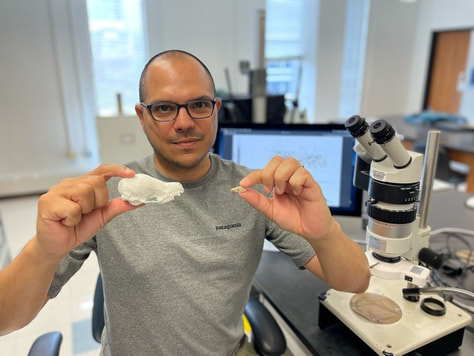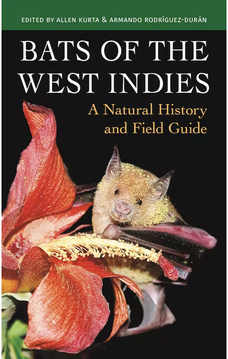Welcome to the SLaBB
(Soto Lab of Bat Biology)

|
PI: Angelo (J. Angel Soto-Centeno, PhD)
Rutgers University Dept. of Earth & Environmental Sciences 411 Boyden Hall 195 University Ave. Newark, NJ 07102 |
In a nutshell:
The Caribbean islands have a very complex geological history, which sets a remarkable stage to study biogeographic and evolutionary patterns in the animals and plants that inhabit this archipelago. Research in the SLaBB focuses on mammalian extinctions, phylogeography, and systematics, particularly using Caribbean bats as a model. Check out our science section to learn more about what we do.
The Caribbean islands have a very complex geological history, which sets a remarkable stage to study biogeographic and evolutionary patterns in the animals and plants that inhabit this archipelago. Research in the SLaBB focuses on mammalian extinctions, phylogeography, and systematics, particularly using Caribbean bats as a model. Check out our science section to learn more about what we do.
Our research happens at Rutgers University – Newark!
** If you are interested in bats, ecological niche modeling, extinctions, mammalogy, paleontology, phylogeography, and systematics contact me at angelo.soto[at]rutgers.edu. Details here **
** If you are interested in bats, ecological niche modeling, extinctions, mammalogy, paleontology, phylogeography, and systematics contact me at angelo.soto[at]rutgers.edu. Details here **
Welcome to the #PhyloClub |

Click here to order from
Cornell University Press |
Latest news:
Jan 2024: Our latest expedition to Puerto Rico yielded a ton of new discoveries. Keep tuned for up coming publications including new extinct species that are new to science!
Jan 2024: New paper by grad student Pedro Mônico accepted! New species limits for the big brown bat (Eptesicus fuscus). Will share the details from the Royal Society Open Science.
Dec 2023: PI Angelo spent 10 days in Costa Rica as part of the steering committee meeting for Global South Bats, and was elected as Coordinator for the Caribbean and Latin America. Stay tuned for more info on how we will promote inclusive and equitable research opportunities for Latino students.
Oct 2023: The SLaBB rocked NASBR with 6 talks and posters by all grad students and former postdocs, including a Karl Koopman award to Pedro Mônico for best presentation in biogeography and phylogenetics. Way to go!
Sept 2023: We got a new paper accepted on the invasion risk of Eucalyptus snout beetles in South America. Check out the details in Ecology and Evolution: doi.org/10.1002/ece3.10531
Feb 2023: Our new book on the Bats of the West Indies is almost out. Pre-order your copy here: Bats of the West Indies – A natural history and field guide. Cornell University Press.
Dec 2022: Paper accepted! We have a new article on how environment helps explain phenotypic convergence in hoary bats! Check it out in Nature Scientific Reports.
Dec 2022: It's official! Amani Abdelsalam just graduated with her Masters after successfully conducting studies on NJ bats at the SLaBB
Aug 2022: With deep sorrow, we say goodbye to Camilo. He's moving on to a new position with the NY Mammal Survey. Thanks for a great 3 years of postdoc!
Jun 2022: Back in the field with Camilo, Lázaro, Justin, and Pedro! Great times bat catching and digging new holes in search of fossils
Aug 2021: We got a new NSF funded project! Chronological context of species loss in a Caribbean vertebrate community
Jul 2021: Check out our most recent research spotlight from Rutgers School of Arts & Sciences – Newark. https://bit.ly/35v908x.
Apr 2021: We have a new publication looking at populations of Stenoderma rufum and how deforestation and hurricanes affect their connectivity. Live at Scientific Reports: www.nature.com/articles/s41598-021-88616-7.
Sep 2020: Check out our latest vertebrate extinction chronology from Cuba. 17 localities & 27 taxa. Live at Quaternary Science Reviews: doi.org/10.1016/j.quascirev.2020.106597.
